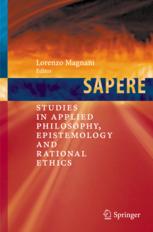
Source. http://www.springer.com/series/10087
STUDIES IN APPLIED PHILOSOPHY, EPISTEMOLOGY AND RATIONAL ETHICS (SAPERE)
Editor-in-Chief Lorenzo Magnani, Department of Philosophy and Computational Philosophy Lab, University of Pavia, Pavia, ITALY
Editorial Board Atocha Aliseda, Universidad Nacional Autonoma de Mexico (UNAM), MEXICO Giuseppe Longo, Ecole Normale Supérieure et CREA, Ecole Polytechnique, Paris, FRANCE Chris Sinha, University of Portsmouth, Portsmouth, UK Paul Thagard, Waterloo University, Waterloo, Ontario, CANADA John Woods, University of British Columbia, CANADA
Studies in Applied Philosophy, Epistemology and Rational Ethics (SAPERE) publish new developments and advances in all the fields of philosophy, epistemology, and ethics, bringing them together with a cluster of scientific disciplines and technological outcomes: ranging from computer science to life sciences, from economics, law, and education to engineering, logic, and mathematics, from medicine to physics, human sciences, and politics. The series aims at covering all the challenging philosophical and ethical themes of contemporary society, making them appropriately applicable to contemporary theoretical and practical problems, impasses, controversies, and conflicts.
Our scientific and technological era has offered “new” topics to all areas of philosophy and ethics – for instance concerning scientific rationality, creativity, human and artificial intelligence, social and folk epistemology, ordinary reasoning, cognitive niches and cultural evolution, ecological crisis, ecologically situated rationality, consciousness, freedom and responsibility, human identity and uniqueness, cooperation, altruism, intersubjectivity and empathy, spirituality, violence. The impact of such topics has been mainly undermined by contemporary cultural settings, whereas they should increase the demand of interdisciplinary applied knowledge and fresh and original understanding. In turn, traditional philosophical and ethical themes have been profoundly affected and transformed as well: they should be further examined as embedded and applied within their scientific and technological environments so to update their received and often old-fashioned disciplinary treatment and appeal. Applying philosophy individuates therefore a new research commitment for the 21st century, focused on the main problems of recent methodological, logical, epistemological, and cognitive aspects of modeling activities employed both in intellectual and scientific discovery, and in technological innovation, including the computational tools intertwined with such practices, to understand them in a wide and integrated perspective.
Studies in Applied Philosophy, Epistemology and Rational Ethics mean to demonstrate the contemporary practical relevance of this novel philosophical approach and thus to provide a home for monographs, lecture notes, selected contributions from specialized conferences and workshops as well as selected PhD theses. The series welcomes contributions from philosophers as well as from scientists, engineers, and intellectuals interested in showing how applying philosophy can increase knowledge about our current world.
Initial proposals can be sent to the Editor-in-Chief, prof. Lorenzo Magnani, [email protected]: • A short synopsis of the work or the introduction chapter • The proposed Table of Contents • The CV of the lead author(s)
For more information, please contact the Editor-in-Chief at [email protected]://urbanguyb.blogspot.com/

